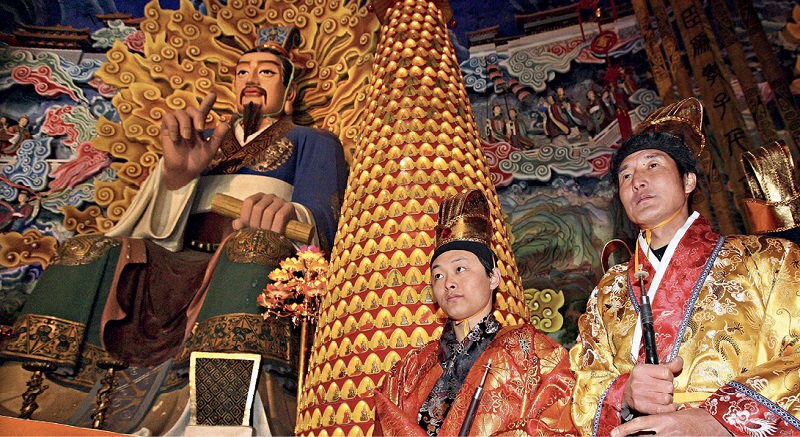
People hosting a traditional ceremony of the Cold Food Qingming Customs at Jiexiu.
Qingming Festival is one of the most important traditional festivals in China. According to records, it is also related to the Cold Food Festival. Qingming and Cold Food were originally two different festivals — one is a solar term and the other is an allusion. Because of the proximity of the two festivals, they were eventually combined into one during the Tang and Song dynasties (618-1279), becoming a traditional festival featuring the acts of visiting family members’ graves, eating cold food, and going on outings.
Jiexiu City in Shanxi Province is recognized as the birthplace of the Cold Food and Qingming culture. The customs of Jiexiu Qingming mainly include a series of activities such as eating cold food, sweeping tombs, hanging willow branches at the gate, going on a trip to the countryside, playing on swings, and flying kites — as well as other activities with strong local characteristics — such as steaming buns and sweeping roofs. In 2011, Jiexiu’s Cold Food and Qingming culture was included in the first batch of national intangible cultural heritage items.
Cold Food has always been an important festival in Shanxi in spring, originally used to commemorate the famous minister of the Jin State (1033-376 BC) during the Spring and Autumn Period, Jie Zitui, who was known for loyalty and patriotism. According to legend, Jie Zitui assisted Jin prince Chong’er in his exile and even presented the prince flesh carved out of his own thigh as food during time of starvation. Later, Chong’er returned to his state and became the ruler of Jin, Duke Wen. Learning Jie Zitui had resigned, the Duke sent for him to return to the imperial court as an official. However, in response to the Duke’s repeated requests, Jie Zitui chose to hide in the Mianshan Mountain near Jiexiu along with his mother. The Duke ordered the mountain to be set on fire to force them out, but he never expected that Jie Zitui and his mother would perish in the fire. Deeply regretful for his reckless behavior, the grief-stricken Duke ordered the people of Jin not to use fire for cooking for three consecutive days and to eat only cold food to mourn the mother and her son.
Today, in Jiexiu, the local community still observes the “cold food” tradition on Qingming, an occasion when the use of fire was forbidden for cooking and food prepared without fire was eaten. Every year before the Qingming Festival each household fashions dough into various animal-shaped buns decorated with red beans, red dates, and other ingredients, and cooks them in steamers. Each family will make at least four kilograms of steamed buns, numbering in the dozens.
The bun “Zitui Swallow,” named after Jie Zitui, is also a festive dish eaten during the Qingming Festival. In many places across China, on the eve of the Qingming Festival, many households make different versions of “Zitui Swallow” with flour, such as single-headed, double-headed, flat-winged, or a small swallow lying on the back of a large swallow.
Another local custom in Jiexiu is stringing the steamed swallow bun on willow twigs which are decorated with multicolored ribbons and hanging them on the eaves of one’s house. When the wind blows, the twigs flutter as if the swallows are flying by. In addition, as the sound of “willow” is similar to “stay” in Chinese — stringing the buns with willow twigs — it appears to be in remembrance of Zitui and preserving the memory of dead relatives.
Jiexiu’s Cold Food Qingming custom embodies the old and rich folk culture of the region. Even after thousands of years, the spirit of Jie Zitui is still honored and the custom has become integrated into the local culture. 